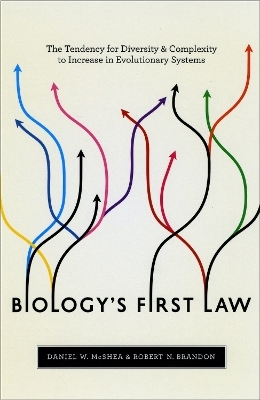
Biology's First Law
The Tendency for Diversity and Complexity to Increase in Evolutionary Systems
Seiten
2010
University of Chicago Press (Verlag)
978-0-226-56226-1 (ISBN)
University of Chicago Press (Verlag)
978-0-226-56226-1 (ISBN)
Life on earth is characterized by three phenomena: adaptation; diversity; and complexity. Natural selection explains adaptation. But what explains diversity and complexity? This book argues that there exists in evolution a spontaneous tendency toward increased diversity and complexity, one that acts whether natural selection is present or not.
Life on earth is characterized by three striking phenomena that demand explanation: adaptation - the marvelous fit between organism and environment; diversity - the great variety of organisms; and complexity - the enormous intricacy of their internal structure. Natural selection explains adaptation. But what explains diversity and complexity? Daniel W. McShea and Robert N. Brandon argue that there exists in evolution a spontaneous tendency toward increased diversity and complexity, one that acts whether natural selection is present or not. They call this tendency a biological law - the Zero-Force Evolutionary Law, or ZFEL. This law unifies the principles and data of biology under a single framework and invites a reconceptualization of the field of the same sort that Newton's First Law brought to physics. "Biology's First Law" shows how the ZFEL can be applied to the study of diversity and complexity and examines its wider implications for biology.
Intended for evolutionary biologists, paleontologists, and other scientists studying complex systems, and written in a concise and engaging format that speaks to students and interdisciplinary practitioners alike, this book will also find an appreciative audience in the philosophy of science.
Life on earth is characterized by three striking phenomena that demand explanation: adaptation - the marvelous fit between organism and environment; diversity - the great variety of organisms; and complexity - the enormous intricacy of their internal structure. Natural selection explains adaptation. But what explains diversity and complexity? Daniel W. McShea and Robert N. Brandon argue that there exists in evolution a spontaneous tendency toward increased diversity and complexity, one that acts whether natural selection is present or not. They call this tendency a biological law - the Zero-Force Evolutionary Law, or ZFEL. This law unifies the principles and data of biology under a single framework and invites a reconceptualization of the field of the same sort that Newton's First Law brought to physics. "Biology's First Law" shows how the ZFEL can be applied to the study of diversity and complexity and examines its wider implications for biology.
Intended for evolutionary biologists, paleontologists, and other scientists studying complex systems, and written in a concise and engaging format that speaks to students and interdisciplinary practitioners alike, this book will also find an appreciative audience in the philosophy of science.
Daniel W. McShea is associate professor of biology, with a secondary appointment in philosophy, and Robert N. Brandon is professor of philosophy, with a secondary appointment in biology, both at Duke University.
| Erscheint lt. Verlag | 10.8.2010 |
|---|---|
| Sprache | englisch |
| Maße | 15 x 23 mm |
| Gewicht | 284 g |
| Themenwelt | Naturwissenschaften ► Biologie ► Evolution |
| ISBN-10 | 0-226-56226-3 / 0226562263 |
| ISBN-13 | 978-0-226-56226-1 / 9780226562261 |
| Zustand | Neuware |
| Haben Sie eine Frage zum Produkt? |
Mehr entdecken
aus dem Bereich
aus dem Bereich
Komplette Neuübersetzung. Mit einem Nachwort von Josef H. Reichholf.
Buch | Hardcover (2018)
Klett-Cotta (Verlag)
48,00 €
Wie die Vernichtung der Arten unser Überleben bedroht - Der …
Buch | Softcover (2023)
Penguin (Verlag)
15,00 €


